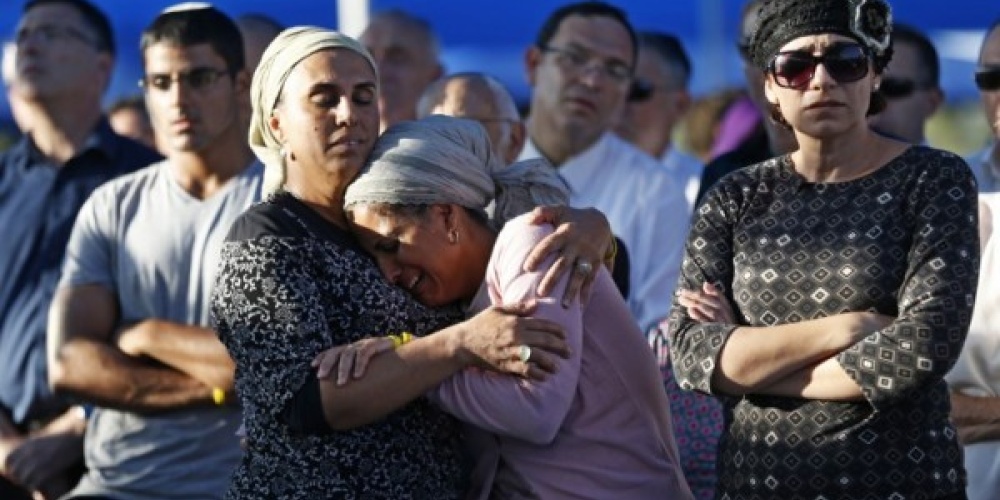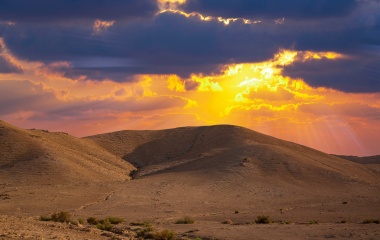
Jews of faith, when faced with imminent death, have departed this world with the words of the shma on their lips. Perhaps the most famous example of this is the tragic death of Rabbi Akiva, one of the ten martyrs we read about on Tisha b'Av. As he was being tortured by the Romans, Rabbi Akiva gained a measure of comfort as he could now literally fulfil the mandate, "'and you shall love the Lord, your G-d, with all your soul', even when He takes your soul" (Brachot 54a). The importance of shma is such is that it is the only Biblical text that we are required to say on a daily basis, and the only mitzvah which is fulfilled twice each day.
The Mishna, the foundation of the Oral Law, begins with the laws of the shma, opening with the question, "From when may one say the evening shma?" It is as if we eagerly await the opportunity to fulfil this most important mitzvah.
Yet strangely enough, this mitzvah only appears in the Torah in sefer Devarim. Why were the words of the shma not included with those we heard at Sinai? The Talmud teaches that kabbalat ol malchut shamayim, the acceptance of the yoke of heaven found in the first paragraph of the shma is the foundation stone that must be accepted prior to the yoke of commandments. Surely we should have expected the shma to appear when G-d made His covenant with us.
The focus of the book of Devarim is on Moshe preparing the Jewish people for entry to the land of Israel. Most of the mitzvoth recorded here are those relating to the nation of Israel, be they appointing a king and a Sanhedrin, laws of social justice, war, and even the concept of communal teshuva. Moshe exhorts the people time and time again not to follow in the corrupt ways of the nations currently in the land, and warns against the dangers of intermarriage. The fear of excessive materialism, brought about by the blessings of the land and leading to forgetting G-d can be heard throughout Moshe's words.
Perhaps the shma, with its acceptance of the yoke of heaven and the command to love G-d is, in many ways, one that is dependant on the land. It is only in Israel that we can fully accept the yoke of heaven, which serves as the basis of the shma; it is only in the land that G-d has chosen that many of the mitzvoth can be fulfilled.
Even more fundamentally, the land of Israel is the central dwelling place of the Divine Presence. When we love someone, we want to be near that person. Those who love G-d would want to be near Him in the land of Israel. The all-embracing nature of our relationship with G-d that is the hallmark of the shma can only be fully implemented in the land of Israel.
Loving G-d is a very difficult mitzvah to observe in the best of circumstances. In times of tragedy, when we cannot fathom the injustices and suffering we see around us, the mitzvah becomes doubly difficult. Conquering and settling the land of Israel is a mitzvah that, our Talmudic Sages warned, would only occur through yishurin, pain and suffering. Yes, it will take great faith to love G-d in the land of Israel. It will take even greater faith to believe that G-d truly loves His people and suffers with us. This theme of G-d suffering in exile appears throughout the kinnot we recited this week.
I do not believe it is coincidental that in the same parsha where G-d empathically rejects Moshe's pleas to enter into the land of Israel, we find the shma. Love of G-d cannot be dependent on G-d answering our prayers. Even (especially?) when G-d acts in a way that seems to us unfair, we must display our love towards Him. We do so by continuing to observe His commandments, by learning Torah, which our commentaries point out is a description of G-d, and by studying the beautiful natural universe that G-d created for our benefit.
Parshat VaEtchanan is always read on the Shabbat following Tisha b'Av. After tragedy, we enter the period of nechama, comfort, reading seven special hafTorot of comfort as we prepare for the Rosh Hashanah season. Let us pray and perhaps even demand that, after close to 2,000 years of Jewish pain, the time for comfort has arrived. May G-d make His love of Jewish people manifest for all to see.
Photo of Iris Yifrach and Bat-Galim Shaer by AFP Photo/pool/Baz Ratner



